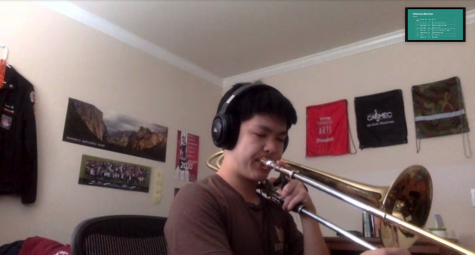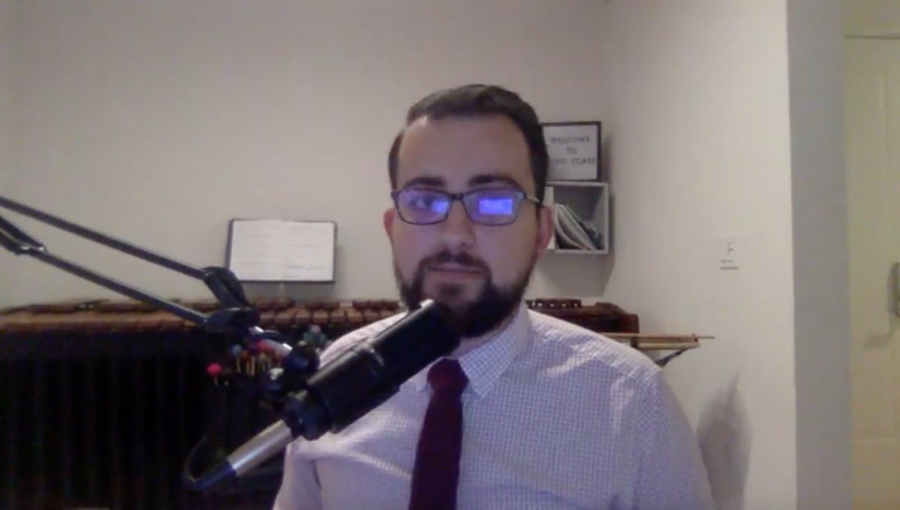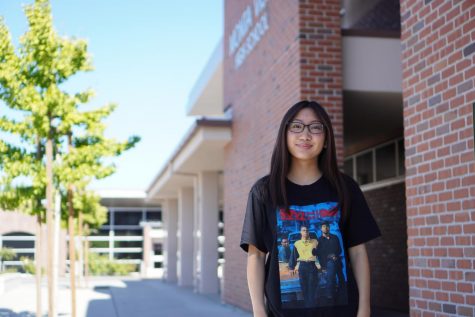COVID-19’s impact on the MVHS Band
How Concert Band’s new instructor and students have adapted to virtual practices
Band Director John Gilchrist talks to wind ensemble through zoom (photo used with permission of John Gilchrist)
October 27, 2020
In order to adapt to remote learning, MVHS Concert Band’s instructor John Gilchrist has had to modify class agendas to accommodate for the inability to practice together physically within ensembles. He’s shifted the focus from large ensemble rehearsals and performances towards smaller groups and individual musicianship by incorporating more activities involving chamber ensembles and small groups, like duets. Gilchrist is also working on giving students more individualized attention than they would have received during in-person learning.
“I think that any of the arts are feeling this [difference in teaching style] right now, especially the performing arts,” Gilchrist said. “It’s a very difficult time to be teaching and learning, performing arts like music, theater, dance”
Junior Thomas Yu, who plays the tenor trombone, has noticed this shift in focus. He views this change in structure as both a positive and negative modification. Although only one person can play at a time over Zoom meetings because of lag issues, each student is allowed opportunities to receive more personalized help from their instructors.

Not only does he attribute the inconvenience of organizing large ensembles to more effective individual focus, but he also believes that not having to practice for the multiple concerts throughout the year has its benefits. Instead of constantly practicing for these concerts in October, December, January and April, there is additional time that can be dedicated to studying in-depth musical concepts and improving individual skills.
According to Gilchrist, for the last couple weeks, the band classes have been working on better understanding the concepts of tone and intonation. Later on, he plans to focus on music composition — having students write their own music.
“We get to actually spend a little bit more time learning about different aspects of music that sometimes would go unnoticed during a typical school year,” Gilchrist said. “So in some ways, it’s kind of gotten us to think outside the box.”
Senior Nelson Mu is part of the Wind Ensemble and plays the French horn. He also believes that there’s an advantage to being able to practice at home and use class time for different purposes. Instead of having to repeat a part together during class when other students need to, Mu can simply focus on the parts he needs to improve, leading to more efficiency. This flexibility allows him and others to prioritize self-improvement, since being able to practice at home eliminates the concern of distracting others.
He acknowledges that their virtual band meetings have minor drawbacks as well, like situational disadvantages, when a student might need guidance fixing their instrument. However, there’s one main con for Mu of these virtual practices — when the ensemble isn’t able to play together as a whole, he feels that it detracts from the purpose of the band.
“It’s obviously still worthwhile to play an instrument, but it makes playing the part more worth it because it meshes well with other parts,” Mu said. “Whereas now, I’m just kind of playing like the accompanying part every day by myself, and I’m like, ‘Great, I played the same eighth note 20 measures, I’m getting really bored of this.’ So, again, I think it’s that whole aspect of not having other people to play with, that really kind of damages and kind of ruins the experience.”
Yu agrees, saying that virtual meetings can have their drawbacks when it comes to musicianship as a whole band. With online practices, it’s hard to perform and build strong relationships with other band members, which they would normally do on-campus during events.
“The thing that defines a band is not, in my opinion, the music making,” Yu said. “What defines a band are the interpersonal bonds that you create, right? The friends you make, the memories you share — and then over Zoom, you don’t have any of that anymore.”
This missing interpersonal aspect has also been an issue that Gilchrist has recognized and aims to address and mitigate. He admits that with Zoom classes, the interaction he gets with students is considerably less than there would be with a normal schooling format. Especially since he is a new teacher at MVHS this year, not having the opportunity to familiarize himself with all 200 of his students in person has been a major disadvantage.
“I think that community is such an important part of being in band and being in orchestra in high school, and I think I’m certainly feeling that it’s very difficult to not have that,” Gilchrist said. “And I’m sure students are feeling the same way.”
In order to address this concern, he has incorporated more community-building activities with his classes. Gilchrist has also discussed the idea of starting a music council of students, which could provide students with more of a voice if they choose to join. Not only does he believe a music council could be a great way for students to interact with each other and practice leadership within ensembles, he also thinks it could help build his own relationships with students.
Mu had expected band classes to be one of the hardest hit classes by virtual learning, but has also found the pandemic’s effect to be interesting. Although he and others like Yu have found the focus on individuality to have its drawbacks, he believes that the flexibility for self-improvement has been a main advantage.
“I’m really grateful that we’ve had a great substitute before, and now we have a great new teacher here,” Mu said. “So I feel like we’re going to have a great year, even if we have some issues with other kinds of aspects like group performance.”





























